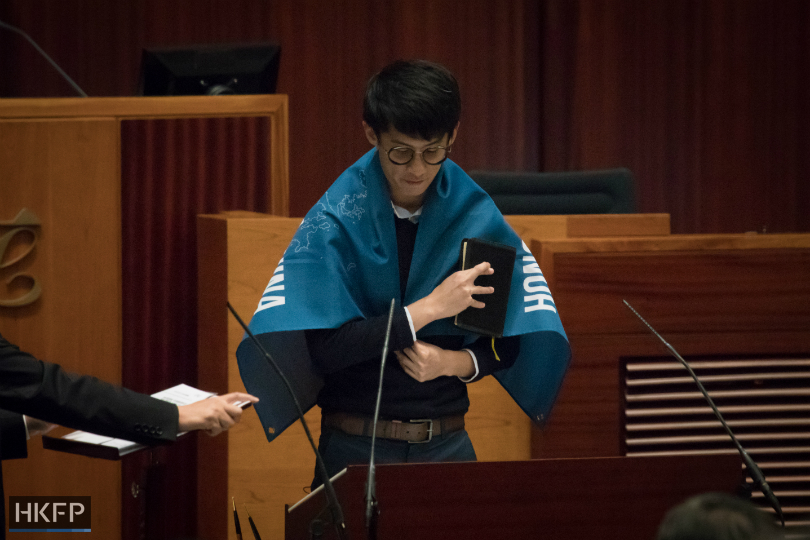Youngspiration politicians Yau Wai-ching and Baggio Leung Chung-hang argued in court on Thursday that the judiciary should refrain from intervening in the internal affairs of the legislature. The appeal judges responded that the Basic Law is superior to common law principles such as non-intervention by the court.
The pair were disqualified from the legislature last Tuesday after the Court of First Instance ruled that they had refused to take their oath by virtue of their controversial conduct during last month’s swearing-in session at the Legislative Council. The Court of Appeal heard the duo’s appeal on Thursday.

Basic Law supremacy
Chief Judge of the High Court Andrew Cheung Kui-nung questioned the argument made by Senior Counsel Philip Dykes, representing Yau, that the court should not intervene in the matters of the legislature based on common law principles.
The judge said that the Basic Law – Hong Kong’s mini-constitution – “trumps” common law principles such as that of non-intervention by the court. Article 104 on oath-taking is applicable to the appeal case, he said.
In common law, legal principles laid down by judges are binding on future cases. It stands in contrast with the civilian law system, in which written constitutions and law codes carry the most weight. The Chinese legal system is a mixture of civilian and socialist law.
Mr Justice Cheung said that the court has jurisdiction over the dispute. He added that the key issue should be whether Yau and Leung had “accurately and effectively” taken their oaths.
Dykes responded that oath-taking is a political issue as it is an internal affair of the legislature. In addition, he said, conduct such as hand gestures cannot be used as evidence for deciding whether an oath-taker was “sincere” or not. His remarks were made in reference to the trial judge’s view that Leung’s crossed fingers while taking his pledge are evidence of his lack of sincerity.

Mr Justice Johnson Lam Man-hon said in response that the issue of whether Yau and Leung had “declined or neglected” to take their oaths in accordance with the Oaths and Declarations Ordinance is a legal, not political, matter.
Dykes said that if the court interferes this time, there will be endless disputes. The court is not the appropriate venue for the politically motivated to challenge any oath-takers, he said.
Principle of non-intervention
Dykes reiterated his position during the trial that the doctrine of separation of powers is enshrined in the Basic Law, and hence the court should not intervene in the internal affairs – such as oath-taking – of the legislature.
Dykes argued that the court can only intervene when the legislature’s president or clerk refuses to administer the oath of a lawmaker, or adopts a capricious standard.
He added that it is for the oath-administrator to decide whether the pair had declined to take the oath, and neither the president nor the clerk have made such a decision. Dykes said the court’s ruling last Tuesday was premature.
Mr Justice Lam asked the counsel whether the issue was self-restraint by the court, rather than jurisdiction. In the trial hearing, Mr Justice Thomas Au Hing-cheung held that the court has jurisdiction over the internal affairs of the legislature. In response, Dykes said his position was that the court should maintain self-restraint on issues relating to the legislature.

Automatic disqualification
Senior Counsel Hectar Pun, representing Leung, said that the court should consider Section 15 of the Legislative Council Ordinance, which states that one of the conditions for a lawmaker’s office to become vacant is when the legislature’s president makes such a declaration in accordance with Article 79 of the Basic Law.
Therefore, Pun said, contrary to the trial judge’s decision, lawmakers cannot be automatically disqualified.
